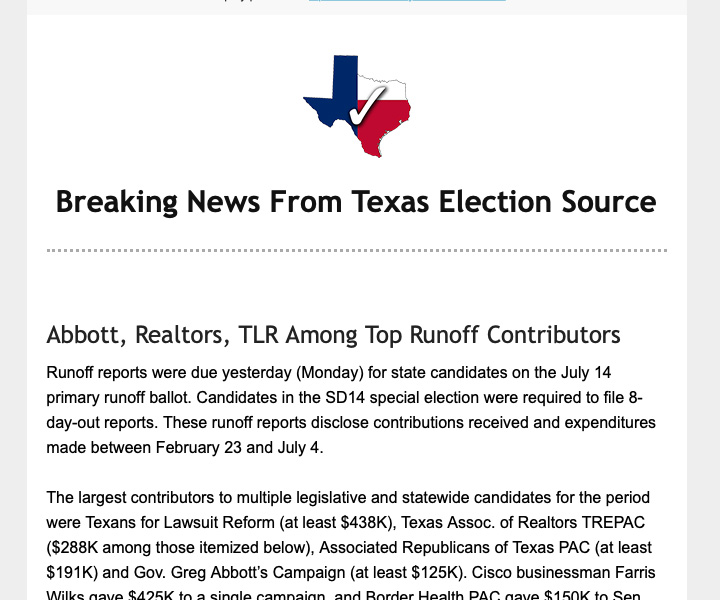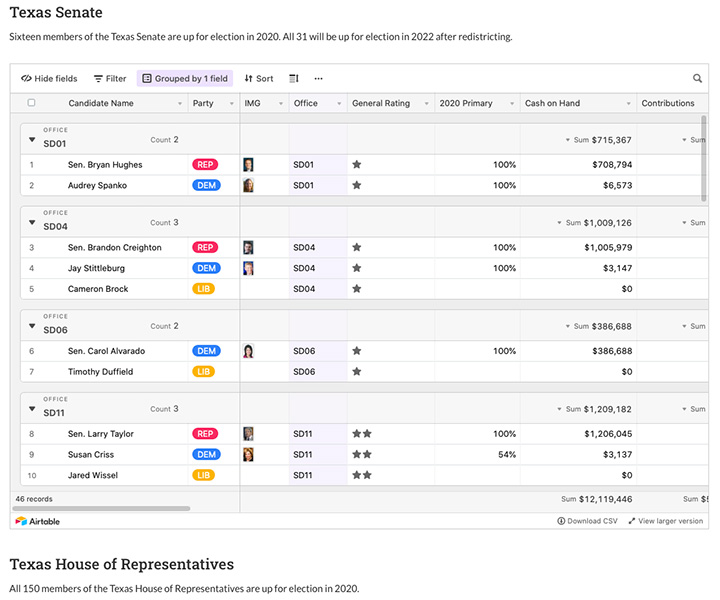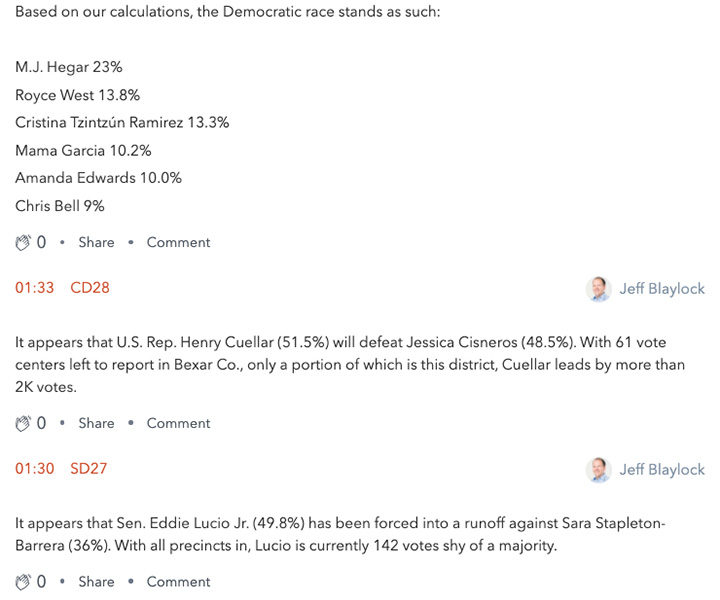Be the Smartest Person in Your Political Crowd
Your Ultimate Political Data Ally
Founded in 2013, TXElects established itself as the premier, subscriber-backed authority on Texas political data and news.
We pride ourselves on delivering incisive, data-driven insights into the ever-evolving landscape of Texas politics and campaigns.
Pioneering political data and innovation, we craft advanced tools tailored to amplify the impact of government relations professionals.
Our steadfast commitment to non-partisanship ensures our independence from any candidate or interest group, keeping our insights unbiased and genuine.
Contact us about TXLege AI – A new Legislative software utilizing the power of artificial intelligence.
What You Get With Your Subscription
See the latest candidate filings, campaign finance information and more for all candidates running for statewide, legislative and congressional offices.
Plus access to all of our archives going back to 2013, local election information and periodic subscriber-only webinars.
We Track the Candidates for You
Texas Election Source tracks around 1,000 candidates for state, legislative and federal office each election cycle. Our Crib Sheets are the best resource for seeing who is running for which seat. If part of your role is to track candidates, we’ll save you a lot of time. Let us do it for you!
Number of Candidates Tracked Each Election Cycle
2024 So Far
2022
2020
Testimonials
Having accurate and up-to-date information and analyses can be a game changer. Texas Election Source is a one stop shop for comprehensive election information and analyses that we rely on during election season and beyond. I recommend it to anyone in our industry.
Texas Election Source is my go-to resource for all election returns. Jeff’s experience in the legislative process and his knowledge of candidates make his analyses invaluable to legislative professionals as well as outside observers.
Monthly
- Full access to our site for an individual
- Our news & analysis delivered via email
- Updated candidate lists
- Live election night returns
- Subscription renews automatically each month
Annual
- Full access to our site for an individual
- Our news & analysis delivered via email
- Updated candidate lists
- Live election night returns
- Subscription renews automatically each year
- $100 savings compared to monthly plan
Group
- Full access to our site for an individual
- Our news & analysis delivered via email
- Updated candidate lists
- Live election night returns
- Contact us for a custom subscription plan
A subscription to Texas Election Source is a taxable service under state law unless your organization is tax-exempt.
Recently Posted News & Analysis
The Unprecedented Influence of the Paxton Impeachment Vote in Republican Primaries
NOV. 29, 2023
Contested Republican primaries are nothing new. In 2022, 33 incumbent Republicans drew primary challengers. Aside from the relatively quiet 2020 primary, an average of 25 incumbent Republican legislators have faced contested primaries. With less than two weeks left until the filing deadline, at least 38 Republican incumbents have drawn at least one primary challenger.
Historically, primary challenges have not been motivated by singular events or votes. Battles between self-identified “true conservatives” and incumbents they called “RINOs” have characterized some of the more prominent primary challenges over the past decade and a half. However, this vague conflict was never a common denominator unifying the intraparty opposition.
This year feels different. The central conflict isn’t being defined by vague pronouncements over who is more conservative. Instead, it is largely being defined by a single vote: the impeachment of Atty. Gen. Ken Paxton. Nearly as many House Republicans (60) voted to impeach Paxton as Democrats (61). Four of the Republican aye votes are not seeking re-election as of this writing. Of the 56 who are seeking re-election, 33 (59%) have at least one announced or filed primary challenger. Of those, 10 have at least two primary challengers. I expect most of the other 23 will also draw at least one challenger before the filing period ends in two weeks.
As for the 21 Republicans seeking re-election who did not vote to impeach Paxton, only five (24%) have drawn primary challengers so far.
Not only are many challengers citing the Paxton vote as a reason to support their candidacy, but Paxton himself is getting involved in these races. He has endorsed at least 11 of the primary challengers of House Republicans who voted to impeach him. He has also endorsed several of the House Republicans who voted against impeachment.
It remains to be seen whether the challengers can marshal this early pro-Paxton momentum into strong campaign finance results, but it seems likely that past large donors to challengers endorsed by scorecard conservative groups would place bets on candidates endorsed by Paxton at the very least.
It also remains to be seen whether these challengers will be able to oust significantly more incumbents than in a typical primary election. Only twice since 1996 – 2012 and 2014 – have more than four Republican incumbents fallen in primary elections. None have fallen in the primary since 2018 (Runoffs are another matter.).
It further remains to be seen whether the Paxton impeachment issue plays any significant role in open-seat primaries. This seems less likely, but it something to watch as primary races heat up.
By Jeff Blaylock – Founder & Senior Editor
Understanding the Constitutional Amendments
November 7th Ballot Propositions Overview
Understanding the Constitutional Amendments
Proposition 1 – HJR 126 HJR 126 by Rep. Burns seeks to constitutionally protect the right to engage in farming, ranching, and other agricultural practices on privately owned or leased property. It provides a framework for protecting these rights while allowing for necessary regulations to protect public health, safety, and natural resources.
Proposition 2 – SJR 64 SJR 64 by Senator West seeks to allow local governments to provide property tax exemptions for real property used to operate child-care facilities. The resolution would enable local bodies to exempt at least 50 percent of the appraised value from ad valorem taxation. The rationale behind this proposition is likely to support and encourage the provision of child-care services.
Proposition 3 – HJR 132 H.J.R. 132 by Rep. Hefner seeks to involve the citizens of Texas directly in the decision-making process regarding the imposition of a wealth or net worth tax. By proposing a constitutional amendment, it aims to prohibit the legislature from imposing such a tax.
Proposition 4 – HJR 2 HJR 2 by Rep. Metcalf seeks to alleviate the burden of rising property taxes in Texas through expanding the appraisal limitation to non-homestead properties, increasing homestead exemptions, and ensuring that appropriations for property tax relief do not affect the constitutional spending limit.
Proposition 5 – HJR 3 HJR 3 By Rep. Bonnen seeks to bolster the state’s higher education institutions to drive Texas’s economy and provide solutions for its burgeoning population and infrastructure needs. It proposes a strategic investment into the renamed Texas University Fund to ensure an educated workforce and support research-driven solutions.
Proposition 6 – SJR 75 SJR 75 by Senator Perry seeks to tackle Texas’s water infrastructure issues by establishing the Texas Water Fund, which would facilitate the financing of water projects. The resolution aims for a sustainable and long-term solution to the state’s water challenges.
Proposition 7 – SJR 93 SJR 93 By Senator Schwertner S.J.R. 93 seeks to establish the Texas energy fund as a constitutional measure to enhance the reliability of the state’s electricity supply. This fund would provide financial support for the construction, maintenance, and modernization of electric generating facilities, ensuring a reliable power grid for Texas.
Proposition 8 – HJR 125 HJR 125 By Rep Ashby aims to establish a broadband infrastructure fund to expand high-speed Internet access across Texas, addressing a critical infrastructure gap that affects millions of Texans. The amendment seeks to ensure the efficient and dedicated use of funds for enhancing connectivity.
Proposition 9 – HJR 2, HJR 2 by Rep Bonnen aims to provide a one-time cost-of-living adjustment to annuitants of the Teacher Retirement System of Texas, under strict financial conditions to ensure the fiscal stability of the TRS.
Proposition 10 – SJR 87 SJR 87 By Senator Huffman seeks to alleviate the tax burden on manufacturers in the medical and biomedical sectors by exempting certain tangible personal property from ad valorem taxation. This measure is intended to enhance the stability and resilience of the Texas healthcare network and medical supply chain.
Proposition 11 – SJR 32 SJR 32 by Senator Blanco seeks to address the funding gap in El Paso County’s parks system by enabling conservation and reclamation districts within the county to issue bonds for the development and maintenance of recreational facilities. This measure aims to improve the quality of life for residents and contribute to the region’s economic vitality.
Proposition 12 – HJR 134 HJR 134 by Rep. Bonnen seeks to fulfill the campaign promise of the current Treasurer of Galveston County by abolishing the office. The resolution outlines a process for transferring the Treasurer’s duties to another qualified individual or county officer, as determined by the Commissioners Court of Galveston County.
Proposition 13 – HJR 107 HRJ 107 by Rep. Price seeks to address the issue of mandatory retirement for state justices and judges by increasing the retirement age from 75 to 79. This change reflects modern life expectancies and allows experienced judges and justices to continue serving the state. The amendment also simplifies the provisions regarding retirement, removing the exception that currently allows certain judges to serve beyond the age of 75.
Proposition 14 – SJR 74 SJR 74 by Senator Parker seeks to provide a reliable and dedicated source of funding for the acquisition and development of state parks in Texas. By creating the Centennial Parks Conservation Fund, the resolution aims to ensure the long-term sustainability and enjoyment of state parks for future generations. This fund would help Texas Parks and Wildlife make more permanent investments in state parks, reducing the risk of park closures due to the sale of leased land.
See the breakdown from the Texas Secretary of State here.
©2023 TEXAS ELECTION SOURCE LLC
Special 8 Day Out Update
The special election for the Texas State House District 2, scheduled for November 2nd, is in the spotlight with the release of the latest 8-day-out campaign finance reports by the Texas Ethics Commission. These reports, covering the period from September 29th to October 28th, reveal the financial landscape of the race.
Jill Dutton, an administrative director from Ben Wheeler, emerges as the fundraising frontrunner with $235,000 in contributions. A substantial share of her support comes from Texans for Lawsuit Reform and the Associated Republicans of Texas, contributing $85,000 and $126,000, respectively, accounting for nearly 90% of her total contributions during this period. Adding to her campaign’s momentum, Dutton has launched an attack ad against her opponent Brent Money and secured an endorsement from former Governor Rick Perry on the 30th.
Brent Money, a Greenville attorney, has raised $59,000, with the Defend Texas Liberty PAC being a significant contributor, donating $35,000—59% of his total contributions for this period. However, donations from other expected conservative backers have been relatively modest. Heath Hyde, a Sulphur Springs attorney, holds the third spot in fundraising with $57,000 in contributions, with the Texas Farm Bureau AGFUND as his primary donor, contributing $30,000, which is 53% of his total contributions.
Hyde has overtaken Doug Roszhart, a retired Greenville engineer and Hunt County Republican chair, who has raised $26,000. Hyde’s expenditures stand at $43,000.Kristen Washington, the lone Democrat in the race, has received a modest $3,700 in contributions. When it comes to campaign spending, Dutton and Money lead the race, having expended $104,000 and $112,000, respectively. At this point, we expect a runoff between Dutton and Money.
©2023 TEXAS ELECTION SOURCE LLC
Texas Election Source Product Re-launch: Bridging Political Data with Upcoming AI Capabilities
Texas Election Source Unveils Product Re-launch: Bridging Political Data with Upcoming AI Capabilities
[Austin, 10/31/23] – Celebrating a decade of distinguished service in the realm of Texas politics and campaign analysis, Texas Election Source proudly announces its enhanced re-launch. While artificial intelligence integration is on the horizon, the platform continues to remain a beacon for data-driven political insights.
By intertwining intricate campaign data with prospective AI capabilities, Texas Election Source is set to redefine the tools available to government relations professionals. This advancement ensures subscribers can seamlessly navigate campaign data.
With the campaign fervor building up, our team is ardently working on perfecting AI tools tailored for the impending Legislative Session, empowering our subscribers with campaign knowledge. For those with a passion for diving deep into the intricacies of Texas politics and seeking the best-in-class tools, Texas Election Source remains your trusted partner.
About Texas Election Source:
Launching in November 2013, Texas Election Source quickly rose to prominence as the gold standard for Texas political data and news insights, backed by a loyal subscriber base. We’re committed to providing sharp, data-informed perspectives on the dynamic landscape of Texas politics and campaigns. By constantly innovating in political data, we design state-of-the-art tools primed to maximize the efforts of government relations professionals. As campaign season begins, our subscribers can look forward to enhanced, transformative political tools, with the addition of AI-driven capabilities for the upcoming Legislative Session.
Press Contact:
Laura Carr
Head of Business Development
HD 2 Special Election Update
Six candidates are vying in a special election to fill the unexpired term of former Rep. Bryan Slaton (R-Royse City).
As of Sept. 29, Ben Wheeler administrative director Jill Dutton ($142K) and Greenville attorney Brent Money ($129K) had out-raised the field, and they were also the top two spenders as of that date (Dutton $111K, Money $63K). Sulphur Springs attorney Heath Hyde was third in contributions ($52K) and fourth in expenditures ($33K), narrowly edged out by retired Greenville engineer and Hunt Co. Republican chair Doug Roszhart ($36K).
Money has the backing of Texas Right to Life PAC, True Texas Project, Texas Gun Owners of America, and several current and former lawmakers including former Sen. Don Huffines (R-Dallas) and Sen. Bob Hall (R-Edgewood). The Defend Texas Liberty PAC recently sent a mail piece to potential primary voters accusing Dutton of fundraising from donors to former Democratic gubernatorial nominee Beto O’Rourke. Atty. Gen. Ken Paxton (R) has also endorsed Money, who was a vocal critic of his impeachment.
Dutton has been endorsed by Associated Republicans of Texas PAC, Texans for Lawsuit Reform PAC, and Texas Alliance for Life PAC. Hyde has been endorsed by Texas Farm Bureau AGFUND and Texas Parent PAC.
The candidates’ 8-day-out campaign finance reports should provide more clarity on the race, including the level of financial support from the conservative groups endorsing Money. These reports, which disclose contributions received and expenditures made between Sept. 29 and Oct. 28, were due Monday and should be available online the next day.
We expect the race will go to a runoff, likely between Dutton and Money. Former Greenville council member Kristen Washington, the lone Democrat in the race, could conceivably edge out one of the Republicans to make the runoff. In the 2022 general election, O’Rourke received 21% of the vote head-to-head against Gov. Greg Abbott (R) in the district.
Slaton resigned in May ahead of a unanimous House vote to expel him, marking the first time a member had been expelled from the Legislature since 1927.
Texas Election Source Is Returning with New Partners
AUSTIN, Texas – [August 31, 2023] – Texas Election Source is returning under new ownership. Laura Carr and Eric Davis have partnered with Jeff Blaylock, Founder and original Publisher of Texas Election Source, to leverage the power of artificial intelligence in developing tools that will revolutionize the day-to-day activities of political professionals. Texas Election Sources team of AI engineers are currently developing new features that expand the scope of the original Texas Election Source. The Texas Election Source team will be reaching out directly to key former subscribers to establish direct lines of communication to gather feedback on the future direction of the company. The version one platform is projected to launch in October for users to subscribe.
 Meet Laura Carr: Laura Carr brings a blend of Texas grit and D.C. finesse to her new role at Texas Election Source. Laura began her political career in Washington, D.C., working in various policy and communication roles for legislative offices in both the House and Senate on Capitol Hill. Laura later worked in fundraising at The U.S. Chamber of Commerce and No Labels—a bipartisan nonprofit dedicated to finding common-ground solutions. Laura returned to the Lone Star State, where she served in the Office of the Texas Governor, later making a notable impact as the Government Relations Director at The Brannan Firm—a prestigious firm ranked at the top of Capitol Inside’s Texas Lobby Power Rankings. Today, Laura serves as Policy Director specializing in technology policy in the Texas Senate. As Head of Business Development for Texas Election Source, Laura will be acting as a liaison between new and previous customers.
Meet Laura Carr: Laura Carr brings a blend of Texas grit and D.C. finesse to her new role at Texas Election Source. Laura began her political career in Washington, D.C., working in various policy and communication roles for legislative offices in both the House and Senate on Capitol Hill. Laura later worked in fundraising at The U.S. Chamber of Commerce and No Labels—a bipartisan nonprofit dedicated to finding common-ground solutions. Laura returned to the Lone Star State, where she served in the Office of the Texas Governor, later making a notable impact as the Government Relations Director at The Brannan Firm—a prestigious firm ranked at the top of Capitol Inside’s Texas Lobby Power Rankings. Today, Laura serves as Policy Director specializing in technology policy in the Texas Senate. As Head of Business Development for Texas Election Source, Laura will be acting as a liaison between new and previous customers.
 Meet Eric Davis: A seasoned visionary in the realm of go-to-market strategy. Eric Davis is renowned for his expertise in tech companies in Silicon Valley. Eric’s most distinguished accomplishment lies in his role at Prodigy Software, where he led revenue generation and masterminded the strategic blueprint from the company’s inception to its $100 million acquisition by Upstart Holdings. Beyond his tenure at Prodigy, Eric has continued to contribute to the tech landscape by actively investing in and advising numerous companies at the forefront of introducing new technology into the tech industry, including cutting-edge AI tech. Eric’s understanding of AI and the intricacies of go-to-market strategies brought him the opportunity to work within the underserved realm of Texas politics. As CEO, he is going to use his tech connections and understanding to create game-changing technology for Texas Election Source.
Meet Eric Davis: A seasoned visionary in the realm of go-to-market strategy. Eric Davis is renowned for his expertise in tech companies in Silicon Valley. Eric’s most distinguished accomplishment lies in his role at Prodigy Software, where he led revenue generation and masterminded the strategic blueprint from the company’s inception to its $100 million acquisition by Upstart Holdings. Beyond his tenure at Prodigy, Eric has continued to contribute to the tech landscape by actively investing in and advising numerous companies at the forefront of introducing new technology into the tech industry, including cutting-edge AI tech. Eric’s understanding of AI and the intricacies of go-to-market strategies brought him the opportunity to work within the underserved realm of Texas politics. As CEO, he is going to use his tech connections and understanding to create game-changing technology for Texas Election Source.
About Texas Election Source: Texas Election Source is a subscriber-supported software and news service that provides an authoritative, data-driven perspective on Texas politics and campaigns since November 2013. Texas Election Source offers one of the most accurate and comprehensive tools for understanding Texas elections, focusing on key races and the political climate, and has become a relied-upon resource for political professionals seeking unbiased insights. Texas Election Source maintains non-partisanship and independence from any candidate or interest group, empowering subscribers to make informed decisions in the political arena. Its new ownership is committed to ensuring its legacy as an unrivaled resource for understanding Texas politics.
For media inquiries and more information, please contact: Laura Carr – Head of Business Development Texas Election Source – [email protected]
©2023 Texas Election Source LLC
Texas Election Source Ending Its 10-year Run
Ten years ago, I set out to make my readers the smartest people in their political crowd. My approach was to combine comprehensive election data, campaign finance figures and candidate news with the insights I’ve built over more than three decades of observing Texas politics.
I wanted to look beyond the typical two-year campaign window to identify long-term trends and apply them to the next election. I sought to weed through the noise of numbers and report on only those that were truly important to understanding what happened, what’s happening and what may happen next. And I wanted to do this as objectively and insightfully as possible.
After every general election, I decide whether I will commit myself to putting in the thousands of hours of work necessary to deliver news and analysis at the level of quality I expect from myself. In the past, that answer has been “yes.” This time, I have decided not to continue for the 2023-24 election cycle.
Many reasons and circumstances contributed to this decision, but the biggest is simply this: I’m ready to redirect my energies into new endeavors.
Publication of Texas Election Source will end next week. All outstanding subscription balances will be rebated or otherwise distributed as directed by the subscriber (More details will be forthcoming). Our website will remain up, so access to the archives and existing Crib Sheets will continue for the foreseeable future. Regular emails will cease, but any new content on the site will be sent via email as before.
I will remain on Twitter at @TXElects so long as Twitter remains a viable platform to share election and political news, though my activity there will be reduced. Contact information will remain the same.
Thank you to all the friends, professionals and political junkies who have been a part of this journey, especially those who have been with me from the beginning. You were willing to take a chance on me as Texas Election Source evolved from a crazy idea to an emailed PDF attachment to the fully digital product it is today. I am honored to have earned your faith, trust and business. I appreciate you immensely. And I hope we succeeded in making you the smartest person in the room.
This chapter of Texas Election Source is ending, but a new chapter may one day begin. If years of rummaging through data and observing trends have taught me anything, it’s that nothing in politics is permanent. For now, I will simply say thank you for being a Texas Election Source subscriber!
©2022 Texas Election Source LLC
Poll: Election Denialism Remains High Among Republicans
A third of Texas registered voters continue to believe President Biden did not “legitimately” win the 2020 presidential election, according to the latest Univ. of Texas/Texas Politics Project poll. Three out of five Republicans do not believe Biden won the election “legitimately” and another 16% are unsure – leaving just 24% who accept the results as legitimate.
No credible evidence supports former President Trump’s fantasy that the 2020 presidential election was somehow stolen from him. Yet, that fantasy persists.
Election denialism is more prevalent among older voters than younger ones:
- Aged 65 and older – 46% believe Biden was legitimately elected, 43% do not
- Aged 45-64 – 51% believe the election was legitimate, 38% do not
- Aged 30-44 – 62% believe the election was legitimate, 28% do not; and
- Aged 18-29 – 75% believe the election was legitimate, 10% do not.
Rural voters are more likely to believe Biden’s win was illegitimate (48%) than legitimate (38%), while suburban voters are more inclined to believe its legitimacy (55%) than not (33%).
Most Republicans (59%) do not believe U.S. election results are accurate – 26% believe they are “very inaccurate” – but just 19% of Republicans believe Texas election results are inaccurate. Only 1 in 25 Republicans believe Texas results are “very inaccurate.”
Encouragingly, election denialism has declined, slightly, since the UT/TPP poll conducted shortly after Biden’s inauguration. In that poll, 43% of Texans thought U.S. election results were either somewhat (13%) or very (30%) inaccurate. In the latest poll, the percent of Texans believing U.S. results are very inaccurate has fallen by half to 15%, with much of that difference shifting to somewhat inaccurate (+6%) and somewhat accurate (+11%).
Discouragingly, election denialism has increased since right before the general election. In its October poll, UT/TPP found just 24% of Texans believed U.S. election results were either somewhat (15%) or very (6%) inaccurate.
Faith in Texas election results has remained steady over the past two years.
The poll found fairly divided assessments on job approvals, most of which have held steady for at least two years:
- Greg Abbott’s job approval: 49/41 (24/34 strongly)
- Gov. Dan Patrick’s job approval: 43/36 (19/31 strongly)
- Gen. Ken Paxton’s job approval: 41/37 (19/31 strongly)
- U.S. Sen. Ted Cruz’s job approval: 44/44 (25/36 strongly)
- U.S. Sen. John Cornyn’s job approval: 35/40 (13/25 strongly)
- Biden favorability: 40/49 (17/43 very)
- Trump favorability: 42/48 (20/39 very)
Biden’s net favorability rating of -9 represents the least underwater he has been since his presidential campaign began in 2020.
Looking ahead at the 2024 primary, five out of six Republicans either strongly (53%) or somewhat (30%) approve of Cruz’s job performance. Just 9% of Republicans disapprove (3% strongly). Seven out of 10 “extremely” conservative voters strongly approve Cruz’s job performance.
The poll of 1,200 self-declared RVs was in the field December 2-11 and has a stated margin of error of ±2.89% for the full sample.
©2022 Texas Election Source LLC
‘Audit’ Highlights Irregularities in Dallas, Harris Cos.; Praises Collin, Tarrant Cos.
The Secretary of State’s office released its “Final Report on Audit of 2020 General Election in Texas.” Over the course of 359 pages, the report details “very serious issues” with Harris Co. and “two large problems” with Dallas Co.’s election administration while lauding Tarrant Co. for its “quality, transparent election” and Collin Co. as “the model of how to run elections in Texas.” It also identifies “data inconsistencies” from the four counties it audited, noting that such “inconsistencies, even with valid reasons, weaken the public’s confidence that the election was run properly.”
Indeed, that appears to be the point: highlighting inconsistencies, especially in Democrat-run counties, with a very real outcome being weakened public confidence in elections in those counties.
The report states that “elections are trustworthy” when the Election Code and local procedures are followed. “As outlined in this report, in cases where procedures were not followed, discrepancies and irregularities ranging from small to large ensued.” At no point does the report question the outcome of the election, but that wasn’t its purpose, nor should its findings have led to that conclusion. However, the implication is clear: Republican-run counties run trustworthy elections, while Democrat-run counties do not.
“Texas has sone of the strongest and most effective transparency measures in the country when it comes to administering and auditing elections,” said Secretary of State John Scott, who is leaving the office at the end of the year. “The Texas forensic election audit – which is, by far, the largest undertaken in the nation to date – demonstrates how these measures can and should be used to make sure Texas voters can have confidence in the outcome of any given election, as well as which areas counties need to address to restore confidence going forward.”
Several findings can be easily sensationalized while any “valid reasons” for them are left in the details of the report. The first two findings under Harris Co. implicate more than 300K vote records from mobile ballot boxes, which is a much easier to understand talking point than the jargon-heavy discussions of those findings or Harris Co.’s explanation.
As to the latter, the Harris Co. election office issued a statement saying the staff followed the processes created by Hart InterCivic to ensure accurate counting of “stranded” votes. While much shorter in length, it too is jargon-heavy and difficult for the general public to understand.
The audit report presents information objectively, highlighting what the Secretary of State office’s team found during its lengthy work. The issue is not their work, thoroughness, dedication or documentation. The issue is the inevitable use of those findings, stripped from their pages of details and any responses from the counties, to continue to undermine confidence in elections by those who benefit from doing so.
In its entirety, the report should be considered further evidence that the 2020 election in Texas was secure, accurate and trustworthy. However, it doesn’t say that.
The report says elections are trustworthy when procedures are followed, and here are examples of procedures that weren’t followed. Most of them occurred in Harris and Dallas Cos. The elections run by Collin and Tarrant Cos., while not flawless, were by contrast models of transparency and quality. The implication is elections held by the other two counties are not trustworthy even though the report itself does not reach that conclusion.
©2022 Texas Election Source LLC
Turnout Data Suggest Texas Ranks 39th
Based on preliminary and largely unofficial election results, Texas ranked 39th in turnout, calculated as percent of the voting-eligible population casting ballots for the top office on the ballot. With just over 8.1M votes cast, 42.5% of the estimated 19.1M voting-eligible Texans voted.
It is the state’s highest ranking since at least 2002 and represents a slight uptick from 41st place, which was the state’s ranking in 2018.
SD27: A recount confirmed Sen.-elect Morgan LaMantia’s (D-McAllen) narrow victory over Adam Hinojosa (R).
El Paso: Rep. Art Fierro (D-El Paso) won the runoff over incumbent council member Claudia Rodriguez by more than 300 votes. Roughly 14,500 fewer people voted in the runoff than in the general election, which saw Rodriguez finish first by more than 2K over Fierro. Chris Canales and Brian Kennedy won open seat runoffs.
Fierro lost his House re-election bid in the March primary, falling to Rep. Lina Ortega (D-El Paso) in the only race between paired incumbents.
Laredo: Victor Treviño defeated former council member Mercurio Martinez, 54%-46%, to win the mayoral runoff. Gilbert Gonzalez and Tyler King won open seat runoffs. Gonzalez is the brother of council member Jesse Gonzalez, who he replaces on the council.
©2022 Texas Election Source LLC
Watson, the Once and Future Mayor, Defeats Israel
Former Mayor and former Sen. Kirk Watson (D-Austin) won Austin’s mayoral runoff, 50.4%-49.6%, over Rep. Celia Israel (D-Austin), a margin of 886 votes.
Watson’s margin of victory came from the pockets of Austin outside Travis Co. He received 62% of the nearly 3,600 votes cast in Williamson Co., and he received 27 of the 32 votes cast in Hays Co. Combined, those two counties gave Watson a 903-vote advantage. Israel narrowly carried Travis Co., receiving 50.01% of the 110K votes cast there – a margin of 17 votes.
Three council seat runoffs resulted in the elections of Ryan Alter (60%), Zo Qadri (51%) and José Velásquez (53%) to open seats. Turnout was around 18% of registered voters.
In Corpus Christi, council member Roland Barrera (51%) won re-election by 53 votes. Former council member Everett Roy defeated incumbent Billy Lerma by 51 votes (51.6%-48.4%). Former council member Mark Scott was not so fortunate, losing to Sylvia Campos by 33 votes (51.6%-48.5%). Turnout was south of 7.5% of registered voters.
RRC: Comm. Christi Craddick (R) was elected chair by her colleagues. Customarily, the chair rotates every two years, and Craddick is up for re-election in 2024.
Leadership: House Democrats elected Rep. Trey Martinez Fischer (D-San Antonio) to lead the caucus. He succeeds Rep. Chris Turner (D-Grand Prairie), who did not seek leadership of the caucus this session. Rep. Victoria Neave (D-Dallas) was elected chair of the Mexican American Legislative Caucus.
Campaign Finance: Late last week, federal candidates on the November ballot filed their post-general campaign finance reports. These reports disclosed contributions received and expenditures made between Oct. 20 and Nov. 28. Collectively, federal candidates raised $7.5M and spent $9.6M for the period. Our Crib Sheets have been updated.
These reports generally do not attract much interest since the elections are over, and the candidates are generally beginning to refill their campaign war chests heading into the new Congress. However, there were some figures worth noting.
Around 30% of contributions and expenditures for the period went to three races:
- In CD28, U.S. Rep. Henry Cuellar (D-Laredo) was out-raised, $759K to $258K, and outspent, $882K to $406K, by challenger Cassy Garcia (R).
- In CD15, Michelle Vallejo (D) out-raised U.S. Rep. Elect Monica De la Cruz-Hernandez (R-Alamo), $396K to $342K, but was outspent, $832K to $521K.
- S. Rep. Dan Crenshaw (R-Houston) raised just over $500K for the period – more than any other incumbent – and spent $235K. His Democratic opponent raised $7K and spent $21K.
Crenshaw’s haul brought his contribution total for the election cycle to $15.3M, and he spent $14.6M. Crenshaw received 74% of the vote in the March primary and 66% of the vote in the general election.
Nine members and members-elect ended the period with at least $1M on hand:
- $5.23M – U.S. Rep. Lloyd Doggett (D-Austin)
- $2.03M – U.S. Rep.-elect Wesley Hunt (R-Houston)
- $2.01M – U.S. Rep. Colin Allred (D-Dallas)
- $1.78M – Crenshaw
- $1.44M – U.S. Rep. August Pfluger (R-San Angelo)
- $1.43M – U.S. Rep. Jodey Arrington (R-Lubbock)
- $1.39M – U.S. Rep. Lizzie Fletcher (D-Houston)
- $1.29M – U.S. Rep. Chip Roy (R-Austin)
- $1.23M – U.S. Rep. Beth Van Duyne (R-Irving)
Just missing the cut were U.S. Rep.-elect Morgan Luttrell (R-Houston) with $988K, U.S. Rep. Brian Babin (R-Woodville) with $936K and U.S. Rep. Ronny Jackson (R-Amarillo) with $895K. As of the end of October, U.S. Sen. Ted Cruz (R) had $3.25M on hand, and U.S. Sen. John Cornyn (R) had $1.45M on hand.
For many filers, this report ends the election cycle, and funds raised before the end of the year count toward the next cycle. We use the end of the calendar year as the end of the campaign cycle, so we will also count the candidates’ year-end reports as part of this cycle, consistent with how we handle state candidates.
©2022 Texas Election Source LLC
Abbott Taps Nelson for Secretary of State
Gov. Greg Abbott (R) will nominate Sen. Jane Nelson (R-Flower Mound) to become the state’s 115th Secretary of State.
“Senator Nelson’s lifelong commitment to public service and deep understanding of state government will be assets in her new role ensuring the critical duties of Secretary of State are fulfilled,” Abbott said in a statement. “Nothing is more important to a free society than fair elections, and the State of Texas will continue working to uphold and protect this right.”
Nelson said in a statement that she was looking forward to a “new chapter” in her public service. “Voters expect fair elections with accurate, timely results, and I am committed to making that happen,” she said. “Texans with all political views should have faith in our election system.”
Nelson, who did not seek re-election this year, has served in the Senate since 1993 and should have little difficulty being confirmed by her colleagues. The last three Secretaries of State – David Whitley, Ruth Hughs and John Scott – were not confirmed by the Senate. Whitley and Hughs resigned after failing to receive Senate confirmation, and Scott is resigning before the Senate next convenes.
©2022 Texas Election Source LLC
2024 General Election
Day(s)
:
Hour(s)
:
Minute(s)
:
Second(s)

Laura Carr
Co-Founder & Head of Business Development TXLege AI & Owner TXElects
Laura Carr began her political career in Washington, D.C., working in various policy and communication roles for legislative offices in both the House and Senate on Capitol Hill. Laura later worked in fundraising at The U.S. Chamber of Commerce and No Labels—a bipartisan nonprofit dedicated to finding common-ground solutions.
Laura returned to the Lone Star State, where she served in the Office of the Texas Governor, later making a notable impact as the Government Relations Director at The Brannan Firm. Most recently, Laura was Policy Director specializing in technology policy in the Texas Senate.
Laura earned her Bachelor’s degree in Political Science from the University of Alabama. As Head of Business Development for Texas Election Source, Laura acts as a liaison between new and previous customers.

Jeff Blaylock
TXElects Founder & Senior Editor
Jeff Blaylock offers more than 25 years of political analysis, campaign, government, and advocacy experience, Jeff is a noted expert on Texas elections and the legislative process. He served the Texas House of Representatives as a Chief Committee Clerk for the powerful State Affairs Committee and the Financial Institutions Committee. During his time in the Capitol, Jeff became a legislative process and rules expert. No point of order was ever sustained against the committees’ legislation under his leadership. Jeff served as a policy and budget analyst for the White House’s Office of Management and Budget and the U.S. Department of Veterans Affairs. He served in various management roles in numerous political campaigns across the country.
He began offering his election insights and predictions to his public affairs clients in 2005. He published Texas Election Source for nearly a decade and returns now as Senior Editor. Jeff understands public policy and the ways issues can resonate in elections. As managing director at the respected public affairs firm Public Strategies (now Hill+Knowlton Strategies), he advised clients on legislative strategies, public affairs, strategic and crisis communication, and brand reputation.
Jeff earned a Bachelor’s degree in journalism with a political science minor from Texas Christian University and a Master’s in public policy from Georgetown University. Jeff is currently the VP of Client Services at Kith, a crisis management consulting firm.

Eric Davis
Co-Founder & CEO TXLege AI & Owner TXElects
Eric Davis is a seasoned visionary in the realm of go-to-market strategy. Eric is renowned for his expertise in tech companies in Silicon Valley. His most distinguished accomplishment lies in his role at Prodigy Software, where he led revenue generation and masterminded the strategic blueprint from the company’s inception to its $100 million acquisition by Upstart Holdings.
Beyond his tenure at Prodigy, Eric has continued to contribute to the tech landscape by actively investing in and advising numerous companies at the forefront of introducing new technology into the tech industry, including cutting-edge AI tech. Eric’s understanding of AI and the intricacies of go-to-market strategies brought him the opportunity to work within the underserved realm of Texas politics.




